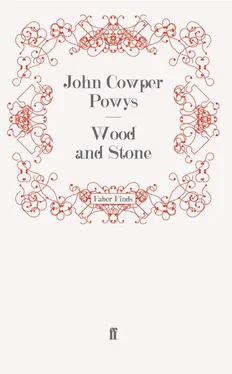An hour later the door between the two rooms was hesitatingly opened, and a white figure stole to the head of Gladys couch. “You’re not asleep, dear, are you? Oh Gladys, darling! Please, please, please, don’t make me bathe with you! You don’t know how I dread it.”
But the daughter of the Romers vouchsafed no reply to this appeal, beyond a drowsy “Nonsense — nonsense — let’s only pray tomorrow will be fine.”
The night-owls, that swept, on heavy, flapping wings, over the village, from the tower of St. Catharine’s Church to the pinnacles of the manor, brought no miraculous intervention from the resting-place of the Holy-Rood. What was St. Catharine doing that she had thus deserted the sanctuary of her name? Perhaps the Alexandrian saint found the magic of the heathen hill too strong for her; or perhaps because of its rank heresy, she had blotted her former shrine altogether from her tender memory.
CHAPTER VIIIDYLLIC PLEASURES
MORTIMER ROMER could not be called a many-sided man. His dominant lust for power filled his life so completely that he had little room for excursions into the worlds of art or literature. He was, however, by no means narrow or stupid in these matters. He had at least the shrewdness to recognize the depth of their influence over other people. Indeed, as he was so constantly occupied with this very question of influence, with the problem of what precise motives and impulses did actually stir and drive the average mass of humanity, it was natural that he should, sooner or later, have to assume some kind of definite attitude towards these things. The attitude he finally hit upon, as most harmonious with his temperament, was that of active and genial patronage combined with a modest denial of the possession of any personal knowledge or taste. He recognized that an occasion might easily arise, when some association with the aesthetic world, even of this modest and external kind, might prove extremely useful to him. He might find it advisable to make use of these alien forces, just as Napoleon found it necessary to make use of religion. The fact that he himself was devoid of ideal emotions, whether religious or œesthetic, mattered nothing. Only fools confined their psychological interest within the narrow limits of their subjective tastes. Humanity was influenced by these things, and Romer was concerned with influencing humanity. Not that these deviations into artistic by-paths carried him very far. He would invite “cultivated” people to stay with him in his noble House — at least they would appreciate that! — and then hand them over to the care of his charming daughter, a method of hospitality which, it must be confessed, seemed to meet with complete approval on the part of those concerned. Thus the name of the owner of Leo’s Hill came to be associated, in many artistic and literary circles, with the names of such admirable and friendly patrons of these pursuits, as could be counted upon for practical and efficient, if not for intellectual aid, in the contest with an unsympathetic and materialistic world. It was not perhaps the more struggling and less prosperous artists who found him their friend. To most of these his attitude, though kind and attentive, was hardly cordial. He knew too little of the questions at issue, to risk giving his support to the Pariahs and Anarchists of Art. It was among the well-known and the successful that Mr. Romer’s patronage was most evident. Success was a quality he admired in every field; and while, as has been hinted, his personal taste remained quite untouched, he was clever enough to pick up the more fashionable catchwords of current criticism, and to use them, when occasion served, with effective naturalness and apparent conviction.
Among other celebrities or semi-celebrities, across whose track he came, while on his periodic visits to London, was a certain Ralph Dangelis, an American artist, whose masterly and audacious work was just then coming into vogue. True to his imperial instinct of surrounding himself with brilliant and prosperous clients, if such they could be called, he promptly invited the famous Westerner to come down and stay with him in Nevilton.
The American, who knew nothing of English country life, and was an impassioned and desperate pursuer of all new experiences, accepted this invitation, and appeared, among the quiet Somersetshire orchards, like a bolt from the blue; falling into the very centre of the small quaintly involved drama, whose acts and scenes we are now recording. Thus plunged into a completely new circle the distinguished adventurer very soon made himself most felicitously at home. He was of a frank and friendly disposition; at heart an obdurate and impenetrable egoist, but on the surface affable and kind to a quite exceptional degree. He had spent several years in both Paris and Rome, and hence it was in his power to adapt himself easily and naturally to European, if not to English ways. One result of his protracted visits to foreign cities was the faculty of casting off at pleasure his native accent — the accent of a citizen of Toledo, Ohio. He did not always do this. Sometimes it was his humour, especially in intercourse with ladies, to revert to most free and fearless provincialisms, and a certain boyish gaiety in him made him mischievously addicted to use such expressions when they seemed least of all acceptable, but under normal conditions it would have been difficult to gather from the tone of his language that he was anything but an extremely well-travelled gentleman of Anglo-Saxon birth. He speedily made a fast friend of Gladys, who found his airy persiflage and elaborate courtesy eminently to her liking; and as the long summer days succeeded one another and brought the visitor into more and more familiar relation with Nevilton ways and customs, it seemed as though his sojourn in that peaceful retreat was likely to be indefinitely prolonged. It may be well believed that their guest’s attraction to Gladys did not escape the notice of the girl’s parents. Mr. Romer took the trouble to make sundry investigations as to the status of Mr. Dangelis in his native Ohio; and it was with unmixed satisfaction that both he and his wife received the intelligence that he was the son and the only son of one of Toledo’s most “prominent” citizens, a gentleman actively and effectively engaged in furthering the progress of civilization by the manufacturing of automobiles. Dangelis was, indeed, a prospective, if not an actual, millionaire, and, from all that could be learned, it appeared that the prominent citizen of Toledo handed over to his son an annual allowance equal to the income of many crowned heads.
The Pariah of Nevilton House — the luckless child of the Apennines — found little to admire in this energetic wanderer. His oratorical manner, his abrupt, aggressive courtesies, his exuberant high spirits, the sweep and swing of his vigorous personality, the extraordinary mixture in him of pedantry and gaiety, jarred upon her sensitive over-strung nerves. In his boyish desire to please her, hearing that she came from Italy, the good-natured artist would frequently turn the conversation round to the beauty and romance of that “garden of the world,” as he was pleased to style her home; but the tone of these discourses increased rather than diminished Lacrima’s obstinate reserve. He had a habit of referring to her country as if it were a place whose inhabitants only existed, by a considerate dispensation of Providence, to furnish a charming background for certain invaluable relics of antiquity. These precious fragments, according to this easy view of things, appeared to survive, together with their appropriate guardians, solely with the object of enlarging and inspiring the vocarious “mentality” of wayfarers from London and New York. Grateful as Lacrima was for the respite the artist brought her from the despotism of her cousin, she could not bring herself to regard him, so far as she herself was concerned, with anything but extreme reserve and caution.
Читать дальше












